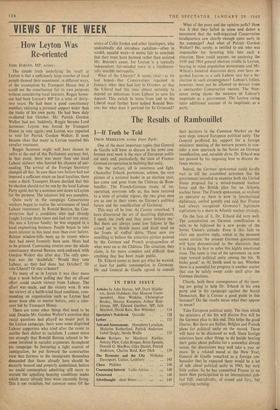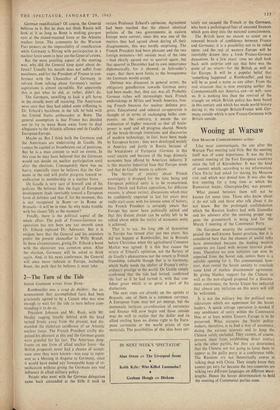The Results of Rambouillet
1—If Truth be Told
DREW MIDDLETON writes from Paris:
One of the most important topics that General de Gaulle will have to discuss in his news con- ference next week is the state of European politi- cal unity and, particularly, the state of Franco- German co-operation in building that unity.
On the surface, all is sweetness and light. Chancellor Erhard, portentous, solemn, the very picture of a national leader in an election year, has come and gone from the Chateau de Ram- bouillet. The French-German treaty of co- operation, everyone tells us, has been restored to a state of pristine vigour, the two great men are as one in their views on Europe's political future and the reunification of Germany.
This may all be true. As Cavour remarked, 'I have discovered the art of deceiving diplomats. I speak the truth. and they never believe me.' But there are always some low fellows in the crowd apt to thumb noses and daub mud on the fronts of stuffed shirts. These now are unwilling to believe the attractive picture painted by the German and French propagandists of what went on at the Chateau. The situation, they claim, is far more complex and difficult than anything that has been made public.
Dr. Erhard seems to have got what he wanted, at least for public consumption in Germany. He and General de Gaulle agreed to consult
their partners in the Common Market on the next steps toward European political unity. The General proffered his support for a foreign ministers' meeting of the western powers to con- sider a new approach to the Soviet on German reunification, and, nzirabile dietu, Dr. Erhard was not pressed by his imposing host to discuss de- fence matters.
Indeed, the German spokesman could hardly wait to tell the assembled newsmen that his government intended to examine both the United States proposal for a mixed-manned nuclear force and the British plan for an Atlantic nuclear force. The French spokesman, as resilient an operator as there is now in international diplomacy, smiled gamely and said that France had always recognised Germany's legitimate aspirations to a share in Atlantic nuclear strategy.
On the face of it, Dr. Erhard did very well. The consultation on German reunification is sure to be followed by a new probe of the Soviet Union's attitude. Even if this fails to elicit any positive reply, which at the moment seems certain, the present German government will have demonstrated to the electorate that it is doing its best to solve this highly emotional issue. The same is true of the agreement on new steps toward political unity among the Six. 'It looks good,' as Al Smith used to say. Whether there is a potential for progress is another matter that can be safely swept aside until after the German elections.
Clearly, both these consequences of the meet- ing are going to help Dr. Erhard in his own party and in his campaign against the Social Democrats. But is Cavour a good guide in this instance? Do the results mean what they appear to mean?
Take European political unity. The item which the ministers of the Six will discuss first will be the German plan to this end. This helps the good Doctor. BM there are Italian, Belgian and French plans for political unity on the record. These will have to be discussed as well. Since foreign ministers have other things to do beside beating their gums about policies for a somewhat distant union, the discussions may well take a year or more. In a relaxed mood at the New Year, General de Gaulle remarked to a foreign am bassador that he expected there would be a lot of talk about political unity in 1965, but very little action. So he has committed France to no more than participation in an international gab- fest full; Undoubtedly, of sound and fury, but signifying nothing.
German reunification? Of course, the General believes in it. But he does not think Russia will look at it as long as Bonn is making goo-goo eyes at the mixed-manned force or the Atlantic nuclear force. The comments by the Warsaw Pact powers on the impossibility of reunification while Germany is flirting with participation in a nuclear force seem to bear out the General's views.
But the most puzzling aspect of the meeting was, why did the General keep quiet about de- fence? Usually his mouth does not suffer from mealiness, and for the President of France in con- ference with the Chancellor of Germany to refrain from talking about Germany's nuclear aspirations is almost incredible. Yet apparently this is just what he did, or rather, didn't do.
The Germans, unwilling to look a gift horse in the mouth, went off rejoicing. The Americans were sure that they had added some stiffening to Dr. Erhard's backbone in the talk he held with the United States ambassador at Bonn. The general assumption is that France has decided not to try to wean Bonn away from its dual allegiance to the Atlantic alliance and de Gaulle's European Europe.
Maybe so. But I think both the Germans and the Americans are underrating de Gaulle. He cannot be cajoled or browbeaten out of positions. But he is a man content to wait on events. In this case he may have believed that the Germans would not decide on nuclear participation until after the elections. Consequently there was no hurry, especially since he believes that the Ger- mans in the end will prefer progress toward re- unification to membership in a nuclear force.
De Gaulle is very sure of himself and of his policies. He believes that the logic of European development leads inevitably toward a European form of defence and that if, for the moment, this is not recognised in Bonn—or in Rome or Brussels—it will be in time. So why make trouble with his closestIlly at the moment?
Finally, there is the political aspect of the whole affair. The path of Franco-German co- operation has not been any too smooth since Dr. Erhard replaced Dr. Adenauer. But it is evident here that the General and his ministers prefer the present chancellor to Willy Brandt. In these circumstances, giving Dr. Erhard a boost with the electorate was common sense. After the election, Germany will be asked to think again. And, at his news conference, the General will once more indicate to Europe, including Bonn, the path that he believes it must take.



































 Previous page
Previous page